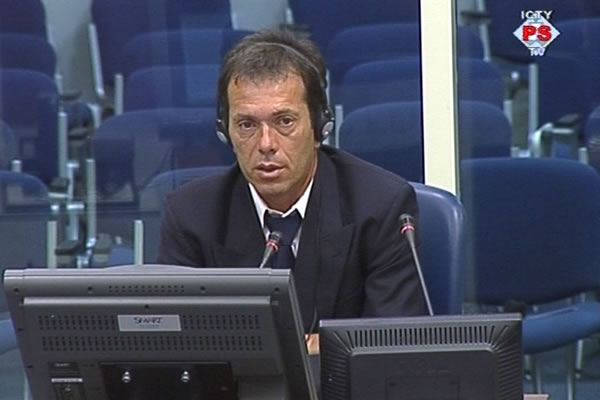Home
WHO TRIED TO TURN DEAD CIVILIANS IN GRUBORI INTO SOLDIERS?
Last week’s evidence of three Croatian police officers was unsealed today. The prosecution used their evidence to prove that General Ivan Cermak ordered or proposed on 27 August 1995 that rifles be left or placed near the dead civilians in the village of Grubori to make it look as if they had been killed in armed conflict. Two witnesses who testified yesterday for Cermak’s defense claimed that they didn’t hear of such an order or proposition. They too participated in cleaning up the terrain n Grubori
 Jozo Bilobrk, witness at the Gotovina, Cermak and Markac trial
Jozo Bilobrk, witness at the Gotovina, Cermak and Markac trial Did General Ivan Cermak order or at least propose a ‘rearrangement’ of the crime scene to make it look as if the civilians had been killed in an armed conflict with the Croatian special police in an incident on 25 August 1995, when five elderly Serbs were killed in the village of Grubori in Krajina.
This was the central issue that dominated the two days in which the prosecution re-opened its case at the trial of generals Gotovina, Cermak and Markac. The three generals are on trial for crimes during and after Operation Storm. To ‘protect the integrity of the trial’ the Trial Chamber ordered the witnesses to testify in closed sessions, and then decided to make their testimony public.
Jozo Bilobrk, police officer from Split, was a key figure in the closed session hearings. Bilobrk was sent to Knin in August 1995. His task was to ‘clean up the terrain’, registering and burying bodies discovered in the liberated area. In the past ten months, Bilobrk has given no less than seven statements about the events of 27 August 1995, all of them different.
Bilobrk was the most straightforward in his conversation with his colleagues, Mikulic and Gerovac, police inspectors from Zagreb, who interviewed him in November 2009 as part of an investigation into who had ordered and committed the crime in the village of Grubori. According to an ‘official note’ about the conversation, Bilobrk said that Cermak issued him an order in front of the police station in Knin to conduct a crime scene investigation in the village of Grubori. Cermak suggested to Bilobrk to ‘place the weapons by the dead bodies in order to make it appear as if there had been an armed conflict, fighting”. Bilobrk, the note went on, ‘retorted angrily’ to Cermak’s suggestion, saying he would not do it and the bodies remained as they were, without any weapons.
In his other statements, Bilobrk gradually veered from the version of events presented in the ‘official note’. In his evidence last week, Bilobrk recanted the whole statement. In court in Zagreb in February 2010, and in his statement to the OTP investigators in May 2010, Bilobrk said that one of Cermak’s anonymous companions suggested to ‘place weapons in the village’, while they were all in front of the police station in Knin. After the defense ‘refreshed’ Bilobrk’s memory showing him some documents drafted at the time, Bilobrk changed the location where the conversation took place: now he claimed the conversation took place on the village road near Plavno. About 20 to 30 people gathered there in several smaller groups, he recounted. As he stood there, he heard somebody behind his back say, ‘weapons should be left in Grubori’, and he turned to face those people and reacted angrily. In his previous statements, Bilobrk had claimed that Cermak was standing five to six meters away, talking to a group of journalists and ‘could surely hear’ the people speak about ‘placing the weapons’ but didn’t react. In his evidence before the Tribunal, Bilobrk was no longer sure if Cermak ‘could hear it’, telling the prosecutor to ask the accused if he heard it.
Finally, in his testimony before the Tribunal Bilobrk repudiated his previous interpretation of the suggestion to ‘place weapons’ in the village. This actually meant that the weapons should be left in the vehicles, at the outskirts of the village, in order not to intimidate the villagers with rifles. Bilobrk however was not able to explain why he never informed anybody – including Cermak’s defense – about this important shift in his interpretation.
When Jozo Bilobrk completed his evidence, the prosecution called police inspectors Zeljko Mikulic and Antonijo Gerovac to the witness stand. They described how they interviewed Bilobrk, who asked questions and who kept notes. Mikulic and Gerovac also recounted how the ‘official note’ was drafted. In the cross-examination, Cermak’s defense insisted that the inspectors had asked ‘leading questions’. They told Bilobrk they had information that ‘high ranking MUP and defense ministry officials’ recommended that something be done at the crime scene and thus, the defense argued, they actually led Bilobrk to mention Cermak’s name. Mikulic and Gerovac strongly denied this claim, claiming Bilobrk’s interview was conducted according to the rules of service. According to them, no suggestions were made to Bilobrk; the police officer from Split volunteered Cermak’s name as a person who said ‘weapons should be placed in the village of Grubori’.
As SENSE reported yesterday, Cermak’s defense called two witnesses: Ivica Vrticevic and Mile Serdarevic. On August 27, 1995. they participated in “cleaning-up” of Grubori. They both claimed they haven’t heard Cermak or anyone else ordering or proposing placing or leaving rifles next to the bodies of victims.
Linked Reports
- Case : Gotovina et al. - "Operation Storm"
- 2010-06-10 PUBLIC RESPONSE TO CONFIDENTIAL EVIDENCE
- 2010-06-03 ‘TEMPORARILY CONFIDENTIAL’ TESTIMONY AT OPERATION STORM TRIAL ENDS
- 2010-04-22 NOT A WORD ABOUT GRUBORI
- 2010-07-05 APPEAL FILED BY MARKAC’S AND CERMAK’S DEFENSE DISMISSED
- 2010-07-20 NEW DETAILED SEARCH OF EU ARCHIVES YIELDS NO RESULTS
- 2010-08-30 PROSECUTION: ‘CRIMES ARE CONTROVERSIAL, NOT OPERATION STORM’
